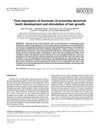34 citations,
June 2015 in “Journal of cardiovascular pharmacology and therapeutics” Direct vasodilators and sympatholytic agents are still useful for certain conditions despite being less common due to side effects and newer drugs.
 1 citations,
January 2010 in “Springer eBooks”
1 citations,
January 2010 in “Springer eBooks” Certain micronutrients may improve hair and nail health, but more research is needed to confirm their benefits.
1 citations,
January 2021 in “Clinical dermatology review” Severe hair loss significantly worsens quality of life.
 38 citations,
September 2019 in “Chinese Medical Journal”
38 citations,
September 2019 in “Chinese Medical Journal” Using steroids can increase the risk of heart problems.
 30 citations,
July 2019 in “Endocrinology”
30 citations,
July 2019 in “Endocrinology” Certain HSD3B1 gene types are linked to worse prostate cancer outcomes and affect treatment response and other health conditions.
 January 2018 in “Clinical dermatology open access journal”
January 2018 in “Clinical dermatology open access journal” The Biofield Energy Treated herbal mixture increased hair growth in mice compared to the untreated mixture.
 658 citations,
June 2003 in “Endocrine reviews”
658 citations,
June 2003 in “Endocrine reviews” Male hormones may play a role in the development of heart disease, and more research is needed to understand their effects.
 40 citations,
July 1995 in “Toxicologic Pathology”
40 citations,
July 1995 in “Toxicologic Pathology” Minoxidil can harm dog's heart.
 34 citations,
December 2009 in “The International Journal of Developmental Biology”
34 citations,
December 2009 in “The International Journal of Developmental Biology” Too much thymosin beta4 causes weird teeth and more hair growth in mice.
 58 citations,
December 2020 in “Mayo Clinic Proceedings”
58 citations,
December 2020 in “Mayo Clinic Proceedings” The conclusion is that individual differences in COVID-19 severity are influenced by factors like age, sex, race, and genetics, which are important for personalized medicine.
 8 citations,
January 2017 in “Fertility and Sterility”
8 citations,
January 2017 in “Fertility and Sterility” Urologic diseases and treatments in older men can negatively affect fertility, and doctors should talk to patients about this.
 15 citations,
May 2010 in “Actas Dermo-Sifiliográficas”
15 citations,
May 2010 in “Actas Dermo-Sifiliográficas” Balding men have higher heart disease risk.
 February 2024 in “Scientific Reports”
February 2024 in “Scientific Reports” Cinnamic acid may help hair grow by activating oxytocin receptors.
 320 citations,
December 2018 in “Frontiers in Immunology”
320 citations,
December 2018 in “Frontiers in Immunology” Changing how mesenchymal stromal cells are grown can improve their healing abilities.
 15 citations,
April 2018 in “Revista Brasileira de Ginecologia e Obstetrícia”
15 citations,
April 2018 in “Revista Brasileira de Ginecologia e Obstetrícia” Insulin resistance is common in PCOS patients and linked to obesity and increased cardiovascular risk.
 8 citations,
July 2012 in “Cambridge University Press eBooks”
8 citations,
July 2012 in “Cambridge University Press eBooks” Androgens can both increase body hair and cause scalp hair loss.
 6 citations,
January 2020 in “The Aging Male”
6 citations,
January 2020 in “The Aging Male” Testosterone replacement therapy improved blood sugar and fat levels without raising prostate cancer risk in Japanese men with low testosterone.
 April 1986 in “Postgraduate Medicine”
April 1986 in “Postgraduate Medicine” Accurate diagnosis and treatment of skin and hair disorders are crucial, with growing focus on hair loss treatments like topical minoxidil.
 31 citations,
June 2020 in “Dermatologic Therapy”
31 citations,
June 2020 in “Dermatologic Therapy” Patients with chronic skin conditions on systemic treatments did not have worse COVID-19 outcomes and could resume their treatments after recovery.

The document concludes that hair loss in women is complex, often linked to aging, health conditions, and nutritional deficiencies, and emotional impacts should not be underestimated.
 12 citations,
January 2013 in “Bundesgesundheitsblatt - Gesundheitsforschung - Gesundheitsschutz”
12 citations,
January 2013 in “Bundesgesundheitsblatt - Gesundheitsforschung - Gesundheitsschutz” Older adults still engage in sexual activities but face challenges like health issues and lack of professional support, highlighting the need for better healthcare provider education and research on sexual fulfillment in old age.
 41 citations,
January 2020 in “Journal of Ovarian Research”
41 citations,
January 2020 in “Journal of Ovarian Research” Quercetin may help with PCOS symptoms, but more research is needed.
 May 2020 in “Fertility and Sterility”
May 2020 in “Fertility and Sterility” Nonobese, normotensive Indian women with PCOS may have a higher risk of heart problems linked to inflammation and insulin resistance.
 6 citations,
May 2021 in “Clinical Chemistry and Laboratory Medicine”
6 citations,
May 2021 in “Clinical Chemistry and Laboratory Medicine” Different ACE2 gene versions may affect COVID-19 impact based on age and suggest some hair loss drugs could be potential treatments.
 4 citations,
October 2007 in “Dermatologic Clinics”
4 citations,
October 2007 in “Dermatologic Clinics” Glucocorticoids and sex hormones affect skin health, with potential for targeted treatments to minimize side effects and treat skin conditions.
103 citations,
December 2021 in “Journal of biological rhythms” Shift work disrupts the body's natural clock, leading to health problems.
 77 citations,
July 2013 in “Best Practice & Research in Clinical Obstetrics & Gynaecology”
77 citations,
July 2013 in “Best Practice & Research in Clinical Obstetrics & Gynaecology” Menopause reduces skin collagen and elasticity, and while estrogen therapy can help, its risks require careful consideration.
 24 citations,
March 2010 in “Value in Health”
24 citations,
March 2010 in “Value in Health” The PCOS-specific questionnaire needs more work to fully measure quality of life in clinical trials.
 68 citations,
September 2018 in “International Journal of Molecular Sciences”
68 citations,
September 2018 in “International Journal of Molecular Sciences” Air pollution (PM10) increases skin inflammation and aging by reducing collagen and may trigger a repair response in skin cells.
 405 citations,
May 2007 in “Journal of The American Academy of Dermatology”
405 citations,
May 2007 in “Journal of The American Academy of Dermatology” Obesity affects skin health, causing conditions like acanthosis nigricans and may require different treatment approaches.


























